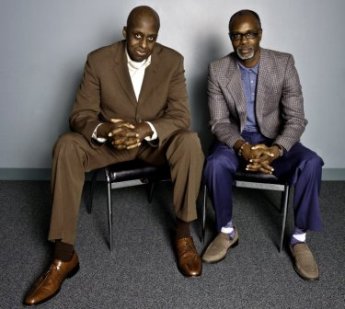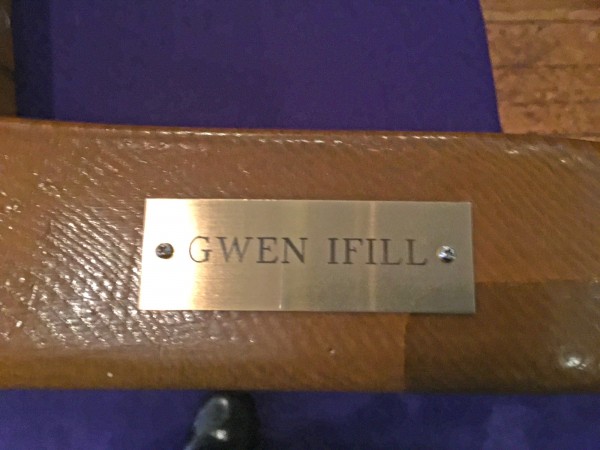 Dark Girls co-directors Bill Duke and D. Channsin Berry Dark Girls co-directors Bill Duke and D. Channsin Berry |
Yvonne Hampton is 69 years old, and lives clear across the country from her older brother, Bill. But she can still rely on him to look out for her -- just as he did when she was growing up.
"The way our parents raised us, we stood up for ourselves, and my brother always protected me," Hampton said.
Even though Bill stuck up for his little sister as they came of age in Poughkeepsie, NY, he couldn't always protect himself, or her, from the cruel words of playmates who viewed their dark skin as offensive.
"We were made fun of, called 'Little Black Sambo' -- that was our introduction to kindergarten," she said. "You were made to feel 'less than' because your skin was darker, and (that) being dark brown or black was ugly."
Hampton's experiences as a "dark girl" were an inspiration for Bill Duke's documentary that explores the sometimes painful, undercover story of colorism -- discrimination based on skin tone -- inside and outside the black community.
Now a respected actor and filmmaker, Duke used his industry clout to bring attention to the issue.
Duke, along with D. Channsin Berry, co-directed and co-produced "Dark Girls," which will be released on DVD Sept. 24.
When it premiered on the OWN channel earlier this year, the film stirred spirited conversation about black beauty, just as it did at screenings around North America.
"DARK GIRLS is a phenomenal documentary that opens the door on that light skinned/dark skinned thang," Oprah tweeted in June.
After the trailer hit the Web in 2011, the filmmakers soon learned that the issue did not only resonate among darker-hued American women.
"I started getting e-mails from women in Poland, and I was thinking to myself, I don't know any black women in Warsaw, or Poland or other places around there," Berry said. "And I kept getting (correspondence) from women's groups in the Netherlands asking us to talk about this, and screen the movie. And it was deep."
In this edited conversation, co-directors Bill Duke and D. Channsin Berry shared with CNN what they learned making the film and how the conversation began.
CNN: How did two male directors become interested in making a film about "Dark Girls"?
Duke: I saw the things that my sister went through -- she's dark skinned -- with boys not considering her attractive in her youth and the pain that it caused her. You have to explain to people the damage that it does to a young woman, and to see it and experience it is something that you don't forget: her crying in her room alone, her trying to lighten her skin, her feeling ugly, me having to beat up young boys because they said she was ugly, that type of thing.
CNN: How do you define "dark girls"? The documentary begins by looking at the issues of intracultural colorism within the black American community, but also touches on issues of color in India and around the world.
Berry: It changed, it really changed through my research. It was about sisters who were dark in complexion. But the more I started to do interviews around the country and around the world -- and this is the crazy thing I found out, it was so enlightening -- that all women around the world are "dark girls" at some point in time in their lives. It has nothing to do so much with the complexion of one's skin. It has everything to do with the lack of women's self-esteem. That's what I learned. And I also learned that pain is pain: If you're dark, you've got some pain, if you're light in complexion, you've got some pain.
CNN: Was there a particularly emotional or difficult time for you, personally, in your process of filmmaking? How did it impact you?
Duke: I think the footage that came in with the children. The little girl, when she's asked 'What's beautiful?' points to everything that is opposite of (what) she is. That one got to me because she's already saying that she is ugly and she's 6 or 7 years old.
At that age, you're seeing (this) instilled in their consciousness, and what it does to their spirit and what it does to their self-esteem. It's a very difficult thing to digest. And that's what motivates me to do something. Because our children are at stake.
CNN: You did the film in 2011 and screened it in major American cities before it was picked up by OWN and aired earlier this year. What was the reaction from audiences? Was there any resistance to a topic that is rarely discussed across racial lines?
Duke: Are you kidding me?! Of course. I was at a theater, and an elderly lady -- beautiful woman -- stands up and says: 'Mr. Duke, I really appreciate your film, but why are you airing our dirty laundry?' and I said to her: 'Because it's stinking up the house.' The things that kill us as a (black) community is our silence.
CNN: How has the conversation around this issue changed from when you began the project in 2011 to now in 2013?
Berry: The conversation is now open, and that's all we can do. I'm not a psychiatrist or psychologist or a sociologist. I'm a filmmaker who decided to point a lens (on this topic). I don't have all the answers. I'm just supposed to present what I think is an issue and have dialogue start. And that was good enough. That was good enough that people recognize that there is an issue. The best thing to do is start conversation about it, so the healing can begin.
Visit film Website




















































































































































































































































































































